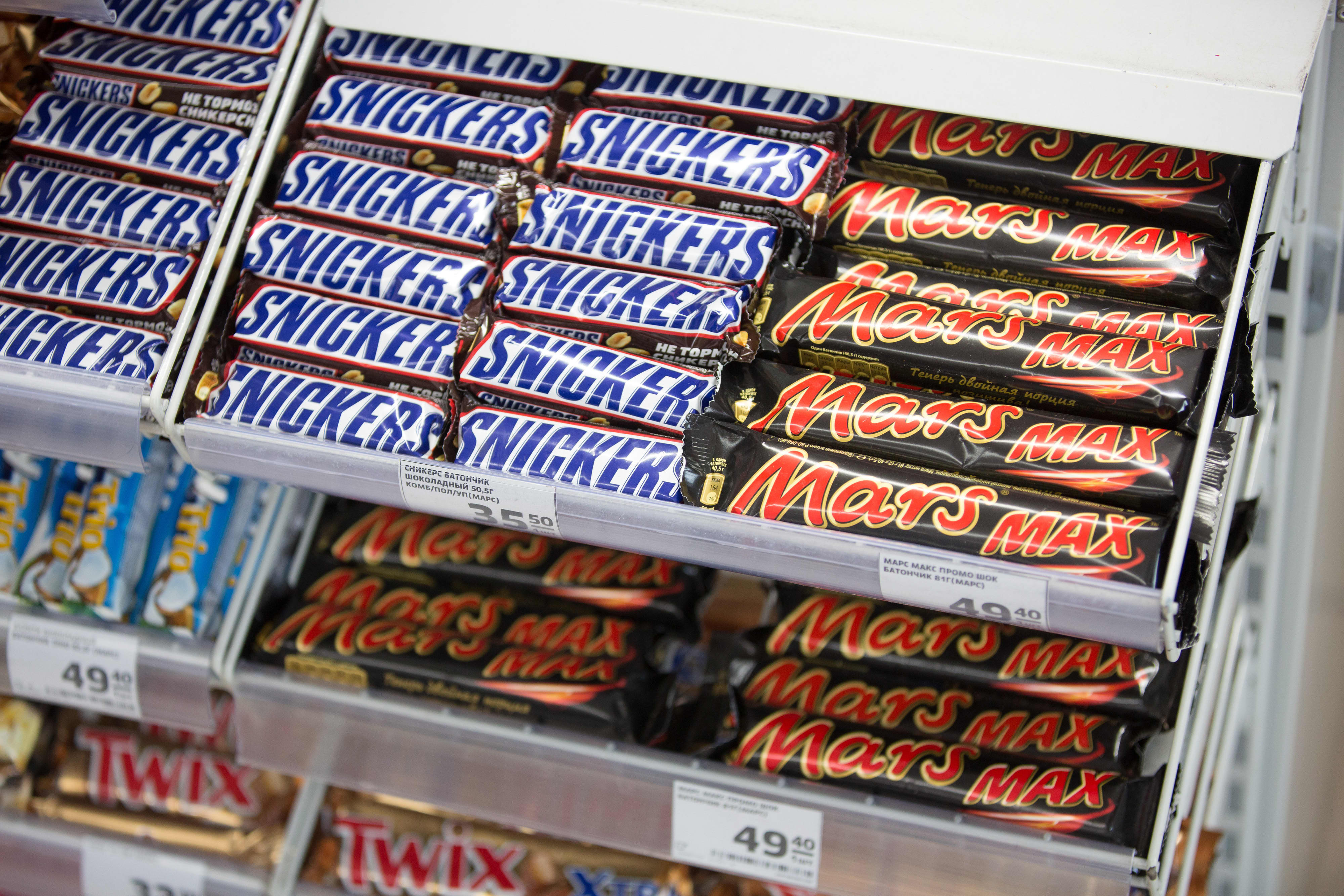
Some of your favorite sweet treats may contain heavy metals, a new report warns.
The report, published Oct. 25, 2023, in Consumer Reports, found heavy metals — lead and cadmium — in chocolate chips, chocolate bars, brownie mix and hot cocoa from major retailers and specialty brands alike.
Among the 48 products Consumer Reports tested, lead and cadmium were detected in every single one. And 16 chocolate products contained heavy metals in amounts that exceeded levels of concern, the report says. Previously, Consumer Reports found lead and cadmium in 23 dark chocolate bars, TODAY.com reported.
The National Confectioners Association, an industry trade group, counters that these products are fine to consume.
Get a weekly recap of the latest San Francisco Bay Area housing news. Sign up for NBC Bay Area’s Housing Deconstructed newsletter.
“Chocolate and cocoa are safe to eat and can be enjoyed as treats as they have been for centuries," Christopher Gindlesperger, NCA spokesman, tells TODAY.com in a statement. "Food safety and product quality remain our highest priorities and we remain dedicated to being transparent and socially responsible."
Test results
Cadmium is a cancer-causing agent, the Centers for Disease Control and Prevention say, and long-term exposure can lead to kidney disease and fragile bones. Exposure to lead can cause neurological issues and is particularly dangerous for children, the CDC says.
In this study, lead and cadmium were found in cocoa solids, which are present in higher concentrations in dark chocolate than in milk chocolate. Heavy metals may enter the cocoa plant via contaminated soil or as dust while the beans are processed outdoors after they’re harvested, the report explains.
Consumer Reports tested the levels of lead, cadmium, arsenic and mercury in three samples from 48 chocolate products, including bars, chocolate chips, cake and brownie mixes and hot cocoa mixes. The team averaged the results from the three samples and measured those results against the standards set out in California's maximum allowable dose levels (MADL) for heavy metals in food.
"We chose (to measure against the California MADL) because the FDA has not set levels in these types of products, so there is no federal level set," James Rogers, Ph. D., director and acting head of product safety testing at Consumer Reports, tells TODAY.com.
Additionally, the Consumer Reports team decided these levels "were health-protective for people," Rogers says, "and in lieu of any federal levels, we felt that those are the best levels to use."
Of the 48 products tested, Consumer Reports found that all of them had detectable levels of lead and cadmium. And 16 showed levels of cadmium or lead in a single serving of the product that exceeded Consumer Reports's level of concern. However, none of the products the organization tested posed a risk of exposure to arsenic or mercury.
While industry representatives "tend to say that their products do not exceed certain levels," Rogers says, "obviously our testing shows something different."
The high levels of lead found in these chocolate products were particularly surprising to Judit Marsillach, Ph.D., assistant professor in the department of environmental and occupational health sciences at the University of Washington School of Public Health.
Cadmium levels, while also concerning, were not as frequently above the Consumer Reports level of concern as lead levels were, Marsillach, who was not involved with the report, tells TODAY.com.
"If the plant absorbs cadmium, then (one would think) cadmium would be more likely to be found higher in general than lead," she says. But only two products, both dark chocolate bars, were over 100% of Consumer Reports's levels. Meanwhile, 15 products in the study had high levels of lead.
"How is that lead getting there?" Marsillach says, adding that she'd be curious to know more about these companies's cultivation and processing practices "because I think it's a very high level of lead."
While our diet is just one of many ways we can be exposed to heavy metals throughout our lives, these levels are concerning, she says.
Chocolate products with the highest levels of lead or cadmium per serving in the Consumer Reports study included:
- Perugina 85% Dark Chocolate
- Evolved Signature Dark 72% Cacao Chocolate Bar
- Hu Dark Chocolate Gems
- Good & Gather Semi-Sweet Mini Chocolate Chips
- Droste Cacao Powder
- Hershey's Cocoa Naturally Unsweetened 100% Cacao
- Great Value Milk Chocolate Flavor Hot Cocoa Mix
- Starbucks Hot Cocoa Classic
- Ghirardelli Premium Brownie Mix Double Chocolate
- Bob's Red Mill Gluten Free Chocolate Cake Mix
- Simple Mills Almond Flour Baking Mix - Chocolate Muffin and Cake Mix
Safer choices
Consumer Reports detected heavy metals in every product they tested. But some products contained far less lead and cadmium than others, according to the report.
Some of the products with the lowest amounts of lead and cadmium in the Consumer Reports study included:
- Sam's Choice Dark Chocolate 72% Cocoa
- Lindt Classic Recipe Milk Chocolate Bar
- Ghirardelli Premium Baking Bittersweet Chocolate Chips 60% Cacao
- Nestlé Toll House Semi-Sweet Morsels
- Navitas Organics Organic Cocoa Powder
- Nestlé Toll House 100% Pure Cocoa
- Ghirardelli Premium Hot Cocoa Mix
- Swiss Miss Milk Chocolate Flavor Hot Cocoa
- Betty Crocker Fudge Brownie Mix
- Great Value Devil's Food Chocolate Cake Mix
Industry response
Industry representatives tell TODAY.com that their products are safe for consumers.
“Our chocolate and cocoa products are safe to eat. We apply strict standards to ensure our products are high quality and comply with all applicable regulatory requirements, including limits for cadmium and lead,” a Nestlé spokesperson tells TODAY.com.
“Minerals such as lead and cadmium are present in the environment, and as a result, agricultural products such as cocoa, may contain these substances in very small amounts,” the statement continues. “We work with our suppliers on an ongoing basis to closely monitor and minimize the presence of these substances in our foods as much as possible. Food safety and quality remain our highest priority.”
Nestlé also owns the Toll House and Perugina brands and produces the Starbucks hot cocoa tested in this report.
"Evolved Chocolate products test well below the levels set in the As You Sow heavy metal settlement, the most rigorous standards in the chocolate industry," the company says in a statement to TODAY.com. The statement says Evolved "regularly tests raw materials and finished goods to ensure compliance and ultimately, consumer safety."
Target tells TODAY.com that its Good & Gather products remain safe, as well. "At Target, we’re committed to providing high-quality, safe products for our guests. The products in this report meet all federal product safety requirements," a company spokesperson said in a statement. (There are no federal limits for the amount of lead and cadmium that most foods can contain.)
Mondelēz International, which owns Hu, and Hershey's both directed TODAY.com to the NCA for comment.
Walmart, Simple Mills, Bob's Red Mill, Droste, Lindt (which also owns Ghirardelli), Conagra (owners of Swiss Miss) and General Mills (owners of Betty Crocker) did not respond to requests for comment. Navitas Organics declined to comment.
What to do if you love chocolate:
The U.S. Food and Drug Administration did not immediately respond to TODAY.com's request for comment.
"Our advice always has been, No. 1, don't panic because we're looking at chronic exposure over the long-term for most consumers," Rogers says. "We're not saying to go cold turkey on chocolate."
However, people who may be more vulnerable to impacts of heavy metal exposure — particularly children and pregnant people — may want to avoid eating certain brands of chocolate that contain heavy metals, he says. And they "should be kept away as far as possible from these products that have high amounts of heavy metals," Rogers adds.
Marsillach agrees, noting that more cadmium and lead can accumulate in the bodies of pregnant people and children. And, in general, she and Rogers advise people to consume chocolate in moderation as part of a varied diet.
For chocolate lovers, though, it may be worth taking a look at what type of treats you're buying and eating. “If you eat a lot of chocolate and the chocolate happens to have high levels of heavy metals, that can be a concern,” Marsillach says.
Still, you don't need to avoid it all together. Instead, opt for the products that turned up lower amounts of heavy metals in this report, Rogers advises. And he hopes the information in this report “empowers the consumer to make wise choices when they go shopping and (about) what they decide to consume.”
Also, keep in mind that milk chocolate generally contains lower amounts of heavy metals than dark chocolate because it's made with fewer cocoa solids. And kids tend to prefer milk chocolate anyway because it's not as bitter as dark chocolate, Marsillach says.
“I don’t want (people) to be alarmed," Marsillach says, "but I do want them to be well informed to make good decisions."
This story first appeared on TODAY.com. More from TODAY:



